
Barbed wire, also known as barb wire, is a type of steel fencing wire constructed with sharp edges or points arranged at intervals along the strands. Its primary use is the construction of inexpensive fences, and it is also used as a security measure atop walls surrounding property. As a wire obstacle, it is a major feature of the fortifications in trench warfare.
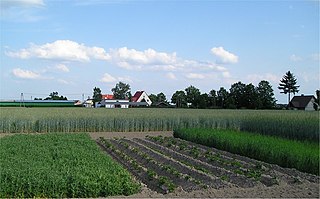
Crop rotation is the practice of growing a series of different types of crops in the same area across a sequence of growing seasons. This practice reduces the reliance of crops on one set of nutrients, pest and weed pressure, along with the probability of developing resistant pests and weeds.

In agriculture, rotational grazing, as opposed to continuous grazing, describes many systems of pasturing, whereby livestock are moved to portions of the pasture, called paddocks, while the other portions rest. Each paddock must provide all the needs of the livestock, such as food, water and sometimes shade and shelter. The approach often produces lower outputs than more intensive animal farming operations, but requires lower inputs, and therefore sometimes produces higher net farm income per animal.

The freedom to roam, or "everyman's right", is the general public's right to access certain public or privately owned land, lakes, and rivers for recreation and exercise. The right is sometimes called the right of public access to the wilderness or the "right to roam".

A tap is a valve controlling the release of a fluid.

Jones Lake State Park is a North Carolina state park in Bladen County, North Carolina in the United States near Elizabethtown. It covers 2,208-acre (8.94 km2), including the Carolina bay lakes of Jones Lake and Salters Lake. Jones Lake State Park is north of Elizabethtown on North Carolina Highway 242 in North Carolina's Coastal Plain region. The park offers year-round recreation, including fishing, swimming, boating, hiking, picnicking and environmental and historical education programs.
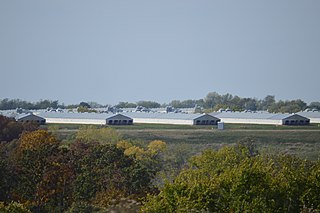
In animal husbandry, a concentrated animal feeding operation (CAFO), as defined by the United States Department of Agriculture (USDA), is an intensive animal feeding operation (AFO) in which over 1,000 animal units are confined for over 45 days a year. An animal unit is the equivalent of 1,000 pounds of "live" animal weight. A thousand animal units equates to 700 dairy cows, 1,000 meat cows, 2,500 pigs weighing more than 55 pounds (25 kg), 10,000 pigs weighing under 55 pounds, 10,000 sheep, 55,000 turkeys, 125,000 chickens, or 82,000 egg laying hens or pullets.
The Countryside Code is a set of guidelines designed for use by both the public and land managers across England and Wales. It is titled as a guide for enjoying parks and waterways, coast and countryside. It was established in 2004 as a relaunch of The Country Code, which existed since the 1930s.

Campdrafting is a unique Australian sport involving a horse and rider working cattle. The riding style is Australian stock, somewhat akin to American Western riding and the event is similar to the American stock horse events such as cutting, working cow horse, team penning, and ranch sorting.
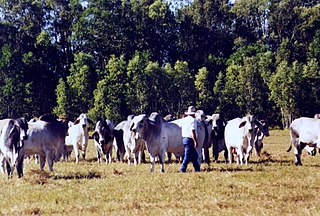
In Australia, a stockman is a person who looks after the livestock on a station, traditionally on horse. It has a similar meaning to "cowboy". A stockman may also be employed at an abattoir, feedlot, on a livestock export ship, or with a stock and station agency.
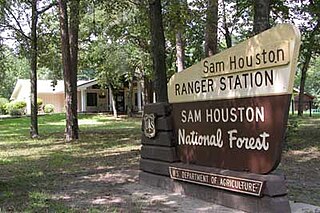
The Sam Houston National Forest, one of four National Forests in Texas, is located 50 miles north of Houston. The forest is administered together with the other three United States National Forests and two National Grasslands located entirely in Texas, from common offices in Lufkin, Texas. The units include Angelina, Davy Crockett, Sabine, and Sam Houston National Forests, plus Caddo National Grassland and Lyndon B. Johnson National Grassland. There are local ranger district offices located in New Waverly. It is located in portions of three Texas counties including Montgomery, San Jacinto, and Walker.
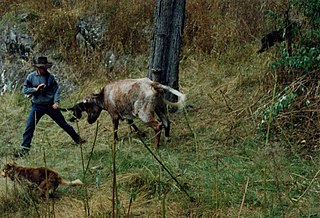
A muster (Au/NZ) or a roundup (US/Ca) is the process of gathering livestock. Musters usually involve cattle, sheep or horses, but may also include goats, camels, buffalo or other animals. Mustering may be conducted for a variety of reasons including routine livestock health checks and treatments, branding, shearing, lamb marking, sale, feeding and transport or droving to another location. Mustering is a long, difficult and sometimes dangerous job, especially on the vast Australian cattle stations of the Top End, 'The Falls' (gorge) country of the Great Dividing Range and the ranches of the western United States. The group of animals gathered in a muster is referred to as a "mob" in Australia and a "herd" in North America.

The Hermit Trail is a hiking trail in Grand Canyon National Park, located in the U.S. state of Arizona. This trail provides access to a historic area of Grand Canyon and offers a more challenging route to the Colorado River for more experienced canyon hikers.

A stock route, also known as travelling stock route (TSR), is an authorised thoroughfare for the walking of domestic livestock such as sheep or cattle from one location to another in Australia. The stock routes across the country are colloquially known as The Long Paddock or Long Paddock.

Sembawang Hot Spring Park is a natural hot spring and a public park in Singapore. It is located beside a military camp about 100 metres (330 ft) off the main road, Gambas Avenue. Like hot springs worldwide, it can have health healing properties with proper use in moderation, and its natural spring water had once been bottled commercially by Fraser and Neave, under the brand name of Seletaris. Since its discovery in 1909, the spring has been through a few changes of ownership and potential redevelopment proposals. The hot spring has a rural rustic feel for visitors to unwind from the hustle and bustle of the modern metropolitan city. The National Parks Board took over the ownership of the park for redevelopment, which officially reopened on 4 January 2020. Sembawang Hot Spring is one of two hot springs in Singapore, with the other located on Pulau Tekong.
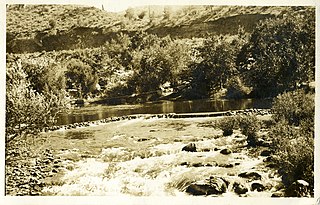
Miracle Hot Springs is an unincorporated community in the Kern River Valley, in Kern County, California. It is located along the Kern River in the Sequoia National Forest 10 miles (16 km) west of Lake Isabella, California, at an elevation of 2,382 feet (726 m).
DuPuis Management Area is a 21,875 acre protected area in northwestern Palm Beach County, Florida and southwestern Martin County, Florida. Recreational opportunities include hunting, horseback riding, cycling, camping, hiking, auto touring, and fishing. During hunting periods it is closed to other use. The property includes a visitor center. Dogs are not allowed on the property. The park includes 22 miles of hiking trails, including a stretch of the Ocean to Lake Trail. There is also an equestrian campground and 40 miles of horseback riding trails. The park is located off State Road 76. It is along the Ocean to Lake Trail.

Vleesbaai, a seaside vacation town, situated between Mossel Bay and Gouritsmond in Western Cape, South Africa.
Water in Arkansas is an important issue encompassing the conservation, protection, management, distribution and use of the water resource in the state. Arkansas contains a mixture of groundwater and surface water, with a variety of state and federal agencies responsible for the regulation of the water resource. In accordance with agency rules, state, and federal law, the state's water treatment facilities utilize engineering, chemistry, science and technology to treat raw water from the environment to potable water standards and distribute it through water mains to homes, farms, business and industrial customers. Following use, wastewater is collected in collection and conveyance systems, decentralized sewer systems or septic tanks and treated in accordance with regulations at publicly owned treatment works (POTWs) before being discharged to the environment.
This glossary of agriculture is a list of definitions of terms and concepts used in agriculture, its sub-disciplines, and related fields, including horticulture, animal husbandry, agribusiness, and agricultural policy. For other glossaries relevant to agricultural science, see Glossary of biology, Glossary of ecology, Glossary of environmental science, and Glossary of botanical terms.
















